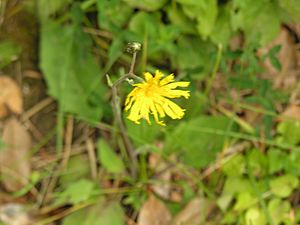Radyr hawkweed facts for kids
Quick facts for kids Radyr hawkweed |
|
|---|---|
 |
|
| Scientific classification | |
| Kingdom: | |
| (unranked): | |
| (unranked): | |
| (unranked): | |
| Order: | |
| Family: | |
| Tribe: |
Cichorieae
|
| Genus: | |
| Species: |
H. radyrense
|
| Binomial name | |
| Hieracium radyrense (Pugsley) P.D. Sell & C. West
|
|
Radyr hawkweed, also known by its scientific name Hieracium radyrense, is a super rare plant. It's an endemic species, which means it only grows in one small place: Radyr in south Wales, UK. You won't find it anywhere else in the world!
Scientists first discovered this plant in 1907. It was officially named a species in 1955. Radyr hawkweed belongs to a group of plants called Hieracium, often known as hawkweeds. It's incredibly rare. Surveys done between 1998 and 2004 found only about 25 plants still alive.
What Makes Radyr Hawkweed Special?
Radyr hawkweed is a perennial plant. This means it lives for many years and can flower more than once in its lifetime. It usually blooms in late spring to early summer, from late May to early June or July.
The few plants found in a place called Danybryn in Radyr grew on a grassy bank and a lawn. They liked to grow where there was some shade from trees and shrubs.
How to Spot Radyr Hawkweed
Radyr hawkweed has some special features that help identify it.
- Leaves: Its main leaves, which grow in a circle at the base of the plant (a "rosette"), are shaped like an oval or a spear tip. They have sharp points and unique teeth along their edges.
- Hairs: You can see tiny, star-shaped hairs on the bracts that surround the flower head.
- Stem Leaves: The plant also has two or three leaves on its stem. These are sharply toothed, especially near the bottom.
- Flowers: The flower petals, called ligules, have small hairs at their tips.

